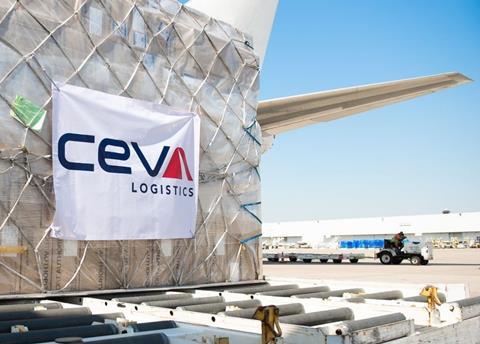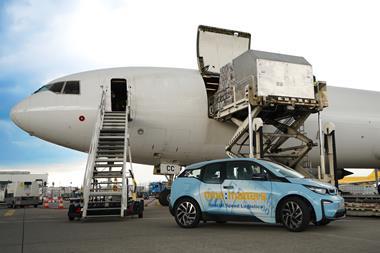For air cargo carriers and forwarders who handle automotive logistics alike, there is plenty of business to be done in this specialised segment of the airfreight sector, but there are also challenges to be overcome.
Lufthansa Cargo, part of Germany’s national flag-carrier airline group, is one of the carriers that transports all types of automotive spare parts – in its case, everything from windshields to engines and spare parts for production sites, right up to entire cars.
According to Carolin Gerstenmaier, head of industry development at the freight carrier: “Our well-trained teams look back on many years of experience and have transported all kinds of cars, with which we are trusted by our customers.”
It moves automotive parts on a daily basis in both its own fleet of 21 freighters as well as in the bellyholds of Lufthansa, Brussels Airlines, Austrian Airlines, Discover Airlines and SunExpress aircraft.
For the transport of whole vehicles, maindeck capacities of Lufthansa Cargo freighters are preferred as bellies are often not large enough, but automotive spare parts can in most cases be transported in passenger aircraft bellies as well as in freighters; which is used depends on the routes and volumes being flown.
Overall, though: “Due to the size of our fleet and our dense global network of more than 300 worldwide destinations, we are able to steer our network flexibly according to our customers’ demands or to unforeseen logistical challenges [while also meeting] ad-hoc requests from suppliers,” Gerstenmaier says.
Automotive shipments represent a substantial proportion of Lufthansa Cargo’s business. And, says Gerstenmaier: “The distribution of demand and volumes over time is not linked to specific seasonal effects and therefore [automotive] remains an important business throughout the whole year.
“Nevertheless, market dynamics or global issues can cause disruptions within supply chains, influencing demand. Urgently needed goods can only be transported quickly and safely worldwide via airfreight.”
Around 80% of all Lufthansa Cargo’s shipments fly via its main hub in Frankfurt and most of the regular automotive cargo shipments out of Germany are also handled there, especially in the case of cargo transported on its freighter aircraft. For special projects or shipments, Stuttgart and Hannover also serve as origin airports for shipments transported in the bellies of passenger aircraft.
Specialist product
Arun Nail, product development manager at Etihad Cargo, explains that the cargo division of the Abu Dhabi, UAE-headquartered Etihad Aviation Group regularly transports a variety of automotive-related loads.
Its capabilities include the transportation of numerous auto parts as well as full vehicles, carried on its specialist FlightValet product.

“We provide these services on both a scheduled, ongoing basis and for one-off charters, ensuring flexibility and reliability for our customers in the automotive sector,” he informs.
Etihad Cargo transports automotive parts on all types of aircraft on its network – as for Lufthansa Cargo, the decision on aircraft type is based on customer needs.
Depending on the dimensions of the vehicles involved, Etihad Cargo carries full-sized cars, utilising both its freighters and bellyhold capacity.
The freight carrier handles particularly high volumes of automotive loads through Milan, given the high demand for sports cars made in Italy.
Other key stations for Etihad Cargo include Frankfurt and London Heathrow, which of course connect to its global network via its Abu Dhabi hub.
At least for Etihad Cargo, the automotive logistics market seems to be booming. It has seen a 50% increase in automotive cargo carried over 2024 so far compared to last year.
“Since the Covid-19 pandemic, traditional transportation flows have changed, and recent issues with ocean shipping have led to more auto parts being transported by air,” Nair observes.
“The geopolitical situation has also stressed the supply chain, increasing the volume of automotive parts we carry. With Abu Dhabi's strategic location, we're central to the logistics chain, meeting specific needs for personal luxury and sports cars flying in and out of Abu Dhabi. Recently, we even transported a unique new car model from the US to the UAE,” he adds.
Trends in the automotive market
“The automotive market in general remains strong, there being high demand for worldwide air cargo services [for this market segment],” Gerstenmaier agrees. And, more specifically: “As observed from general market trends and discussions with industry experts, the long-term strategies of automotive companies and their suppliers clearly indicate a shift towards electric vehicles.
“This results in different types of cargo requirements and an expected rise in demand for airfreight shipping of automotive parts linked to electric vehicle production, such as semi-conductors.”
The most frequented regions for the automotive air transportation segment are currently to be found in the US, Mexico, China and India, Gerstenmaier advises.
Another factor influencing demand for the automotive industry and manufacturing industries in general is the need for resilience within the supply chain, and here a carrier like Lufthansa Cargo hopes to offer an on-demand and reliable service to ensure uninterrupted supply chains.
Geopolitical events, unforeseen crises and new political regulations affect the global supply chains in general, making airfreight a volatile business, Gerstenmaier continues.
“We tackle this aiming at resilient and flexible supply chains for our customers. Therefore, we steer our network flexibly according to our customers’ needs and geopolitical events and are prepared to adjust our network even on short notice.
“Furthermore, we continually evaluate and develop our network in the long term to serve our customers in the future with reliable supply chains,” she adds.
Nair, also of the opinion that the market for automotive shipments by air is currently “very strong”, points out that this may be largely due to the disruptions in sea transport as previously mentioned.

This has created high demand for airfreight solutions in various geographical markets, he suggests.
Dedicated procedures and equipment
Unsurprisingly, Etihad Cargo makes use of specialised equipment and procedures to handle automotive-related cargo.
This includes 16 and 20-foot pallets with straps. For the special requirements of new product launches, vehicles can be covered to prevent visibility, ensuring secure and confidential transportation.
At Lufthansa Cargo, most automotive parts are transported as general cargo, for which no special requirements are necessary and standard process apply, Gerstenmaier informs.
However, some single products like paints, varnishes or even engines are classified as dangerous goods and require different processes.
Furthermore, if complete vehicles are transported, special processes are certainly going to be necessary. The most important operational factors include the volume of capacity required and the security of the shipment.
A particular challenge with modern cars is that wheel rims cannot be used anymore when tying down cars to a pallet due to their aerodynamic designs, leading to deviations from standard processes and the use of specific individual solutions.
The forwarder perspective
Many freight forwarders have looked to tap into the auto market segment’s business opportunities.
Dave Dransfield, global automotive and tire sector leader at supply chain services giant CEVA Logistics, for example, explains that CEVA offers transport solutions for a wide range of automotive products in both the production and aftermarket segments of the automotive industry.
Auto parts are handled on a regular, ongoing basis. The supply chain for original equipment manufacturers (OEMs) in this market is based significantly in Asia in terms of global production but CEVA uses its global network to ensure regular transport services on a recurring basis – weekly, if not daily, he confirms.
Occasional automotive shipments are also handled on an ad-hoc basis, the result in the main of supply chain disruptions or sudden demand spikes, Dransfield informs.
“When customers face an urgent situation, we use our Time Critical product to ensure component availability. The solution leverages a dedicated global team to offer a ‘follow-the-sun’ approach and a central point of contact to ensure an on-time delivery for critical shipments,” he says.
Urgent shipment volumes fluctuate with market conditions, but CEVA continues to deliver “substantial volumes for customers in this time-critical segment”, Dransfield asserts.

Major countries of origin for CEVA's automotive shipments include Germany, China, South Korea, Japan, India and Vietnam, while the most frequent destinations tend to be the US., Mexico, Brazil and Germany. And automotive products represent a growing source of business for CEVA at the moment. Indeed, “In recent times, we have seen double-digit increases in tonnage from Asia Pacific to the Middle East, South Asia, North and South America,” Dransfield declares.
Furthermore, while finished vehicle logistics (FVL) using the airfreight mode of transport is not commonly undertaken by CEVA, it does have FVL capabilities and does handle such shipments for special events and high-value models.
As for cargo-carrying airlines, specific systems and equipment are typically used by forwarders such as CEVA to handle shipments of auto-related shipments.
“We adhere to stringent procedures in handling automotive cargo. For example, in 2021, CEVA became the world’s first company to receive the IATA CEIV [Center of Excellence for Independent Validators] Lithium Batteries certification after teaming with IATA to support the development of the new certification programme,” Dransfield reports.
CEVA currently has nine airfreight stations around the globe that are certified under the programme, ensuring the safe and compliant transport of automotive components, especially those for lithium batteries. These are in Amsterdam, Hong Kong, Frankfurt, Seoul Incheon, Shanghai (Pudong), Singa















